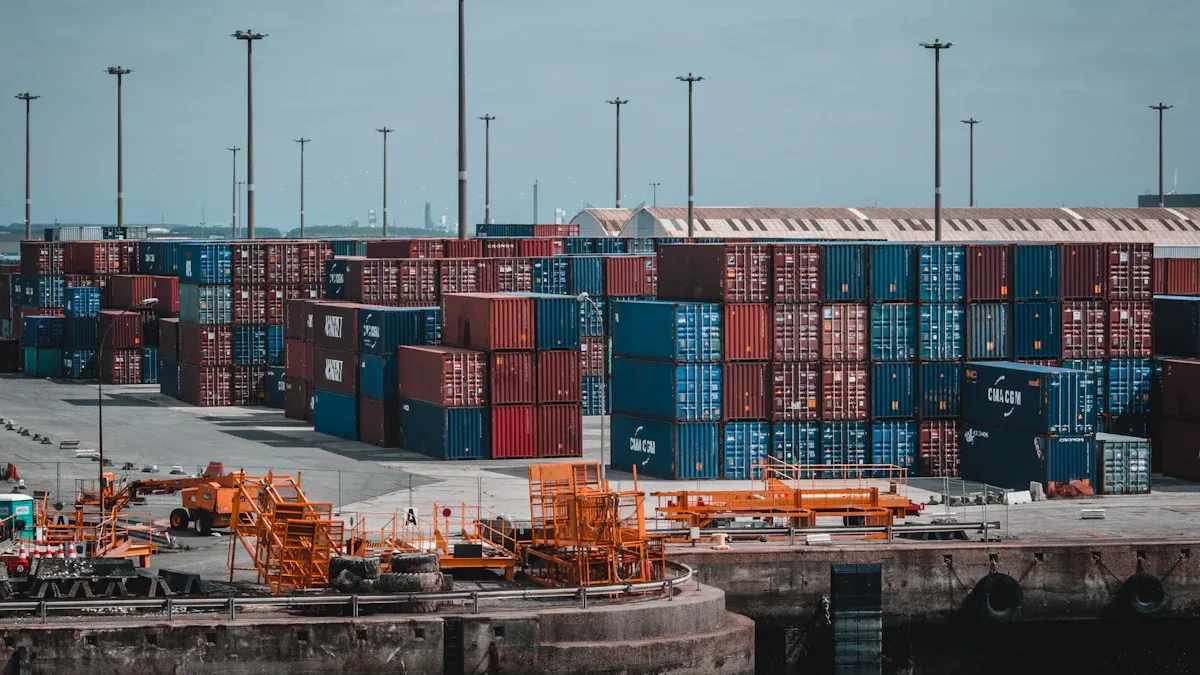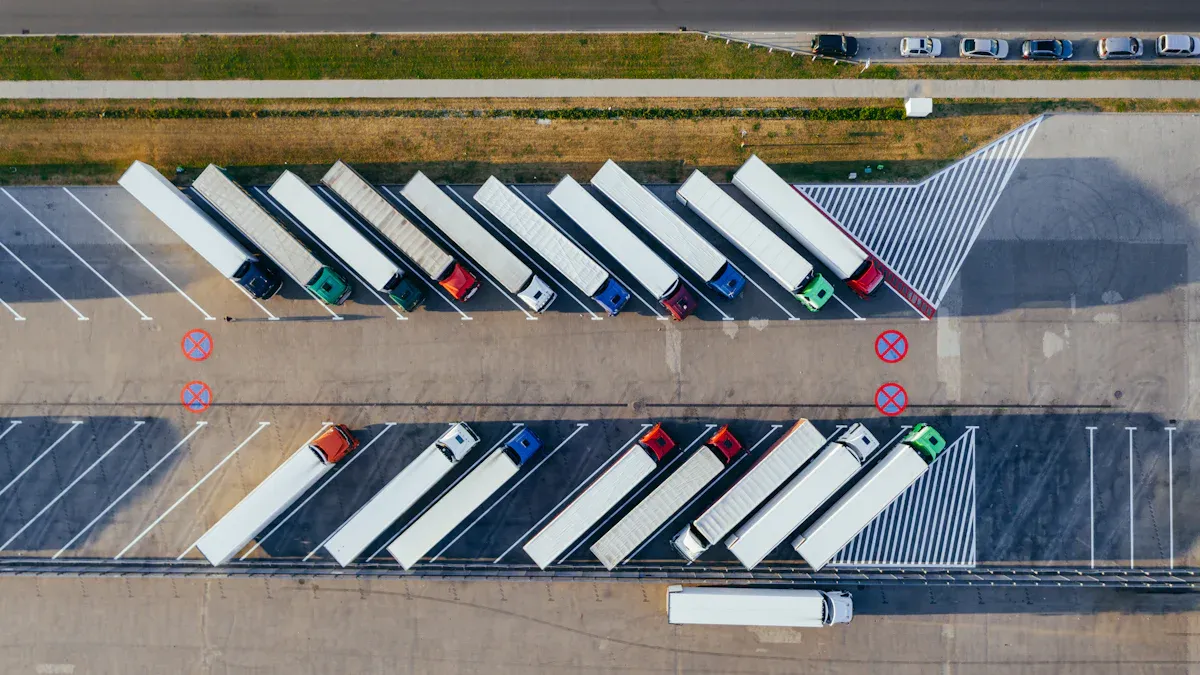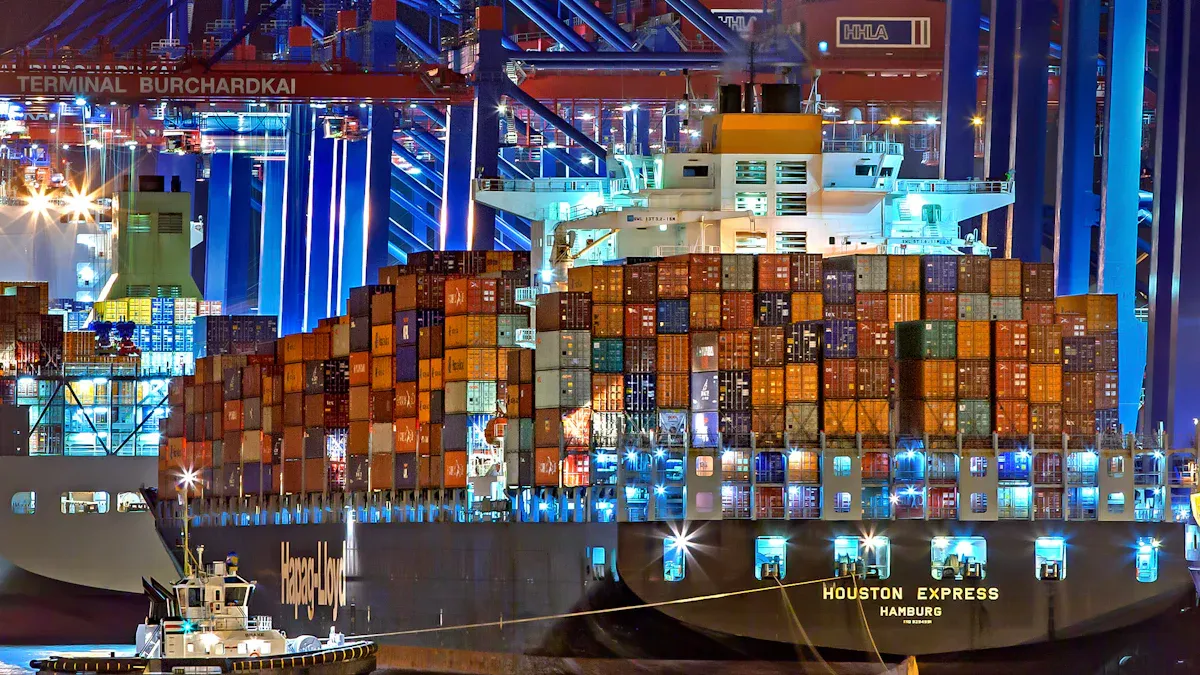How Brokers Streamline Transportation for Shippers and Carriers

You often face tough choices in the world of shipping. Freight brokers step in to make your job easier and more efficient. They help by matching loads, cutting costs, and using smart technology for better results. Many shippers and carriers trust brokers—today, they manage over 20% of all over-the-road freight, up from just 6% in 2000.
Freight brokers manage over 20% of all over-the-road freight, an increase from 6% in 2000.
Challenge | Description |
|---|---|
Tracking Shipments | Not all carriers have reliable tracking systems or timely updates. |
Getting the best price | Finding a fair price can be difficult in freight transportation. |
Damages | Damages can be costly, often linked to improper packaging. |
You gain real value from transportation optimization through brokers, who tackle these challenges with proven solutions.
Key Takeaways
Freight brokers manage over 20% of all freight, helping shippers and carriers save time and money.
Brokers use technology to match shipments with the best carriers, ensuring faster service and fewer delays.
Strong communication and partnerships with brokers lead to better rates and reliable shipping.
Brokers help reduce empty miles by efficiently matching loads to carrier schedules, saving costs and protecting the environment.
Real-time tracking and data analytics from brokers allow shippers to make informed decisions and improve logistics.
Connecting Shippers and Carriers

Load Matching
You want your freight to move quickly and safely. Brokers help you by matching your shipments with the best carriers. They use digital freight matching tools that work like "Uber for trucking." These platforms look at thousands of options in real time. They check things like equipment type, driver location, and market rates. Brokers also use machine learning to predict which carriers will have space before anyone else knows. This means you get faster service and fewer delays.
Brokers do not just pick any carrier. They carefully check each one. They look at performance ratings, communication skills, and delivery history. This process helps you work with reliable partners. When brokers use these tools, they save you time and let you focus on your business.
Building Partnerships
Strong partnerships make shipping easier for everyone. Brokers help you and your carriers build trust. They set up clear communication channels so you always know what is happening. You get upfront details about loads and rates. Brokers use automated systems to check carriers quickly but thoroughly.
Tip: Open communication and fair rates help you avoid surprises and build long-term relationships.
Brokers also pay carriers on time and address common problems like detention time. They invest in long-term partnerships, not just quick deals. This approach helps you get better service and more reliable shipping.
Reducing Empty Miles
Empty miles happen when trucks drive without cargo. This wastes time and money. Brokers help you reduce empty miles by matching loads to carrier schedules. They use data analytics to find the best routes and combine shipments when possible. Brokers also set up drop-and-hook agreements, so carriers can pick up new loads right after deliveries.
Carriers choose loads that fit their routes.
Brokers use their network to match shippers and carriers efficiently.
Data tools help find ways to fill trucks and cut empty trips.
Transportation optimization through brokers means you save money and help the environment by reducing wasted miles.
Transportation Optimization Through Brokers
Route Planning
You want your shipments to arrive on time and at the lowest possible cost. Brokers help you achieve this by using advanced route planning tools. These tools use intelligent algorithms and real-time data to review all available trips, traffic updates, and vehicle locations.
Automated solutions for route optimization use intelligent algorithms and up-to-date data to instantly review all available trips, traffic information, and vehicle availability. This technology optimizes routes to save time, reduce mileage, and keep vehicles full, thereby enhancing transportation efficiency.
Brokers also use predictive analytics to plan for busy seasons. They can spot spikes in demand and secure carrier capacity before prices rise. By analyzing traffic patterns, weather, and delivery windows, brokers adjust routes quickly. This proactive approach helps you avoid delays and reduce fuel costs. You get faster deliveries and fewer disruptions.
Digital platforms enable real-time tracking, providing logistics managers and shippers with live information on the location, expected arrival time, and performance of the routes. This visibility fosters customer trust while enabling brokers to track and mitigate cost and service delays.
Transportation optimization through brokers means you benefit from smarter planning and better results.
Shipment Consolidation
You can save money and time when brokers combine your shipments with others. This process, called shipment consolidation, allows you to share space and costs with other shippers. Brokers look for opportunities to group smaller shipments together, making each trip more efficient.
Consolidated freight shipping allows businesses to combine shipments, leading to lower shipping costs per unit and access to reduced shipping rates.
By combining multiple shipments into streamlined routes, shippers can reduce wasted space and improve network velocity.
Grouping smaller shipments together significantly reduces transportation expenses, especially for goods that do not fill an entire container.
Freight consolidation helps save time, reduce emissions, and cut costs while meeting increasing freight demands.
You also benefit from faster transit times and improved delivery performance. Brokers monitor costs before and after consolidation to show you the savings. When shipments move together, you pay less per unit and enjoy better service. Transportation optimization through brokers uses consolidation to help you compete in a busy market.
Aspect | Description |
|---|---|
Cost per Shipment | Monitoring costs before and after consolidation helps identify savings over time. |
Shared Shipping Costs | Smaller shipments benefit from bulk rates, making them more affordable through shared costs. |
Customs Clearance Savings | Combined shipments can be cleared through Customs on a single entry, reducing expenses. |
Rate Negotiation
You want the best rates for your shipments. Brokers use proven negotiation strategies to lower your shipping expenses. They study the market, understand your needs, and build strong relationships with carriers. This approach helps you get fair prices and reliable service.
Strategy | Description |
|---|---|
Understand the Market | Stay informed about supply and demand, fuel prices, and economic trends to negotiate better. |
Know Your Shipper's Needs | Learn your logistics requirements to reflect the true value of the service. |
Build Strong Relationships | Foster trust with carriers to secure favorable rates. |
Leverage Technology | Use software and analytics to gain insights and strengthen negotiation power. |
Highlight Volume and Consistency | Offer steady shipments to encourage competitive rates. |
Emphasize Shipment Value | Showcase what makes your shipments appealing to carriers. |
Be Open Beyond Rates | Negotiate on payment terms and surcharges for overall savings. |
Understand Carrier Costs | Recognize carrier challenges for fair and effective negotiations. |
Use a Multi-Carrier Approach | Diversify carrier options to increase your leverage. |
Be Prepared to Walk Away | Know your minimum terms and walk away if needed. |
Brokers also use technology and data to support their arguments. They communicate clearly and look for win-win solutions. Transportation optimization through brokers ensures you get the best value for your shipping budget.
Technology and Visibility

Real-Time Tracking
You want to know where your shipments are at all times. Brokers use real-time tracking technology to give you this information. With these tools, you can see the exact location of your freight during transit. Mobile apps let you check shipment status from departure to arrival. You get updates on departure times and expected arrivals. Devices and software send data about your shipment’s location and condition. This helps you manage your logistics better.
Popular platforms like Descartes MacroPoint and Trucker Tools make tracking easy. Trucker Tools uses GPS from drivers’ smartphones to update locations every few minutes. This reduces the need for check calls and improves service. You get accurate ETAs and can handle delays before they become problems.
Real-time visibility lets you:
Track shipments from start to finish
Get accurate delivery times
Respond quickly to any issues
Data-Driven Decisions
You can make smarter choices when you have the right data. Brokers use analytics to help you understand your shipping operations. They track key performance indicators like on-time delivery rates, carrier costs, and shipment volume. Many brokers use transportation management systems (TMS) with dashboards and reporting tools. These features let you see important trends and make better decisions.
Feature | Benefit |
|---|---|
Rate analytics | Access to current shipping and lane rate data |
Built-in accounting | Manage income and expenses easily |
Pay-per-use model | Only pay for the services you need |
With transportation optimization through brokers, you use data to lower costs and improve performance.
Enhanced Supply Chain Visibility
You need a clear view of your supply chain to stay ahead. Brokers use advanced technology to give you this visibility. Artificial intelligence (AI) helps detect problems early and react fast. AI turns raw data into useful information, so you can balance cost, service, and sustainability.
Enhanced visibility means:
Every part of your supply chain shares its status
You can spot and fix issues quickly
Routes and resources get optimized in real time
Brokers also use tools like blockchain and electronic logging devices (ELDs) to increase transparency and accountability. This makes it easier to trace shipments and know who is responsible at every step. Technology helps you build trust and run a more efficient operation.
Compliance and Risk Management
Regulatory Support
You face many rules in transportation. Brokers help you follow these rules and avoid costly mistakes. They check that carriers meet all compliance standards, including driver eligibility and equipment requirements. Brokers also teach carriers about new regulations and help them adjust to changes, such as stricter emissions standards or new safety laws.
Regulatory Challenge | Description |
|---|---|
Carrier Vetting | Brokers check that carriers meet safety and compliance standards. |
Maintaining Trust | Compliant drivers help you build trust with your partners. |
Proactive Support | Brokers educate carriers about changing regulations. |
Equipment Availability | Brokers adjust to limited trucks during fleet upgrades for emissions standards. |
Cost Implications | Newer trucks may increase shipping costs. |
Sustainability Advocacy | Brokers choose carriers who meet environmental standards. |
Carrier Compliance | Brokers verify compliance with state and federal rules to avoid fines. |
Route Planning | Brokers plan routes to meet local emissions standards. |
Brokers also help you with hazardous materials, customs, and environmental regulations. They make sure you have the right paperwork and that your shipments follow the law.
Insurance Solutions
You want to protect your cargo and your business. Brokers offer insurance options that cover many risks. They help you choose the right coverage and work with trusted providers who understand your needs.
Coverage Type | Description |
|---|---|
Contingent cargo | Protects you if a carrier’s insurance denies a claim. |
Freight broker liability | Covers claims if your broker is named in a lawsuit. |
Professional liability (E&O) | Shields you from mistakes or service errors. |
Shipper’s interest cargo insurance | Gives all-risk protection for your cargo. |
Broad business coverage | Includes general liability, cyber, and property insurance. |
Brokers fill gaps in carrier insurance and help you avoid losses from policy exclusions or cancellations.
Safety Documentation
You need the right documents to keep your shipments safe and legal. Brokers help you collect and organize all necessary paperwork. They check that carriers have valid licenses, insurance, and safety records. Brokers also make sure you have the correct documents for hazardous materials, temperature-sensitive goods, and customs.
Brokers support you by:
Verifying carrier documentation and safety records
Keeping detailed records for compliance
Training employees on compliance rules
Renewing bonds to keep licenses active
Brokers help you stay organized and ready for audits. Their support reduces your risk and keeps your shipments moving safely.
You gain real advantages when you work with transportation brokers. They connect you with trusted partners, use smart tools to plan routes, and help you manage risks. Many shippers and carriers report these benefits:
Professional expertise in logistics
Strong relationships with reliable carriers
Benefit | Description |
|---|---|
Brokers match loads to trucks, making the most of every trip. | |
Reducing Empty Miles | They secure backhauls, so trucks rarely travel empty. |
Efficient Load Consolidation | Brokers combine shipments, saving money and time. |
Route Planning and Optimization | Smart tools help find the best routes and avoid delays. |
Experts recommend using brokers for lanes with changing demand and surge shipments. You build long-term success by choosing brokers who value strong relationships.
FAQ
What does a freight broker do?
A freight broker connects you with the right carrier for your shipment. You get help with finding trucks, planning routes, and solving problems. Brokers use technology to make shipping easier and faster.
How do brokers help reduce shipping costs?
You save money because brokers compare rates, combine shipments, and plan better routes. They use data to find the best deals. You get lower prices and fewer empty miles.
Can brokers help with shipment tracking?
Yes! You can track your shipment in real time. Brokers use apps and GPS tools. You see where your freight is at any moment. This helps you plan and avoid surprises.
Are brokers responsible for compliance and safety?
You get support with rules and safety. Brokers check carrier records, keep documents updated, and help you follow laws. They make sure your shipments stay safe and legal.
See Also
Efficient East Coast Import Warehousing With Premier Global Logistics
Simplifying Cross-Border Freight Services on the West Coast
Save Time With PGL’s Drayage And Trucking Services
Enhancing Global Efficiency Through Point-to-Point Logistics Systems
